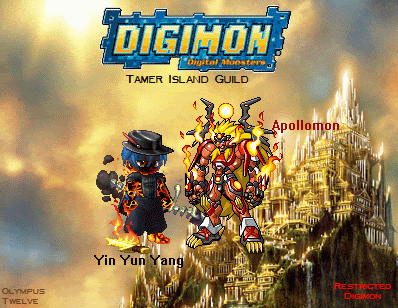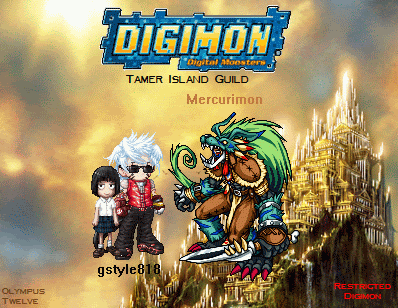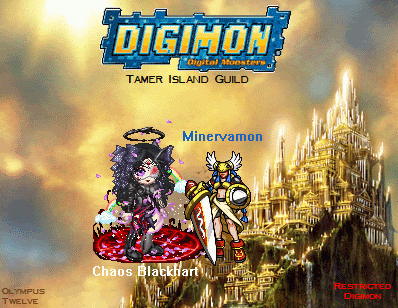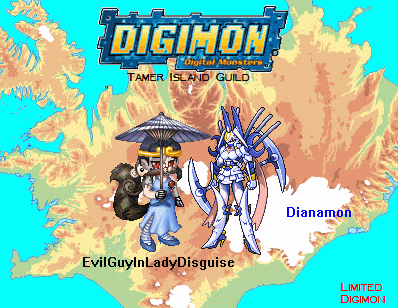|
|
|
|
|
|
|
|
|
 Posted: Sun Mar 16, 2008 6:09 pm Posted: Sun Mar 16, 2008 6:09 pm
 The Olympus Twelve The Olympus Twelve
Home of wise celestial beings catering the Digital World. We reside in the zenith point of the sky, far from reach of any ordinary Digimon capable of flying here with ease. If you have stumbled or found your way in front of out towering doors, then you are blessed.
Welcome to what we call....home.
|
 |
 |
|
|
|
|
|
|
|
|
|
|
|
|
 Posted: Sun Mar 16, 2008 8:34 pm Posted: Sun Mar 16, 2008 8:34 pm
|
|
|
|
|
|
|
|
|
|
|
|
|
 Posted: Sun Mar 16, 2008 8:53 pm Posted: Sun Mar 16, 2008 8:53 pm
|
|
|
|
|
|
|
|
|
|
 Posted: Sun Mar 16, 2008 8:57 pm Posted: Sun Mar 16, 2008 8:57 pm
Apollomon Apollomon is a God Man Digimon which conceals solar-class flame energy. This energy has a terrible ability to smelt all substances, and its almost heartless fervor and pride are barely restrained. Its Special Moves are firing the scorching solar orb generated from the sphere of flame on its back (Sol Blaster), and a single, deadly blow from a fist filled with its hidden power (Phoebus Blow). Also, it can continuously fire red hot arrows from the shining jewels on both of its hands (Arrow of Apollo). Dianamon One of the Olympus Twelve, presiding over ice and water, it is a God Man Digimon able to fight even when the surroundings are below absolute zero. Just as the moon has two sides (light and dark), its personality is of a two-sided nature, and its beauty conceals a terrible power. Its Special Moves are causing the opponent to be bewitched with the mysterious power of the moon, so that it sees itself as its opponent and immediately tears itself to pieces (Crescent Hook), and from the quill-like protrusions on its back, extracting and shooting a faintly sparkling arrow of ice (Arrow of Artemis). Also, the lunar light emitted from the "Goodnight Sisters" on both of its feet can lure the opponent into sleep (Goodnight Moon). Marsmon One of the enigmatic "Olympus Twelve", it is a Digimon god of war in the shape of a panther-man. The Olympus Twelve are guardian deities of the Net possessing ability rivaling that of the Royal Knights, and while they guard the same area, they are seen to have come to follow independent views regarding the occurrence of disasters in the Digital World. Marsmon is familiar with all the ways in the world to fight dirty without weapons, but at the same time he possesses absolute self-confidence regarding bonding through one-on-one combat. It makes use of basic wrestling techniques, but it is strongly concerned about victory and glory, so when push comes to shove he won't hesitate to use concealed weapons like his "Toria Knuckle" or "Metal Korutonosu". However, he exhibits his real power when it uses its bare hands and feet. His special attack "Corona Sanctions" is a method of magnificently splitting the sky while clad in flames Merukimon A God Man type Digimon who is one of the Olympus Twelve Gods; he is known for being the fastest being in the Digital World. It's impossible to see him with the naked eye due to his excellent swiftness, and it's said that all historical pictures of Merukimon are his afterimages. Since he hates to remain in one place, it's difficult to encounter Merukimon naturally in the Digital World, as he's always roaming. His special attack is "Thousand Fist", which uses his blinding movement to shower super-fast punches onto the enemy. Merukimon is also an excellent shaman, as seen in his "Spiritual Enchant" attack, where he slashes the dimension open with his beloved 'Azteca' sword and summons a demon from another dimension. Minervamon  A Demon Man type Digimon who resembles a woman and is one of the Twelve Olympus Gods. She wields marvelous physical strength, able to brandish her large sword that's the same height as her body despite her very diminutive physique. Although innocent and carefree like an infant and always has a sunny disposition, her emotional outbursts are quite violent, so when she's in a bad mood, all sorts of problems will occur. Her special attacks are "Strike Roll", which slashes horizontally with her large "Olympia" sword, and "Madness Merry-Go-Round", which creates a large tornado that divides the land. Neptunmon  A God Beast type Digimon which rules over all Aquatic type Digimon as a member of the Olympus Twelve. Though the Scale Mail which covers Neptunemon's body is made of "Chrome Digizoid" converted into the "Blue Digizoid" which excels in agility, it prefers to remove it when possible due to its poor speed in the water. He construction the deep-sea shrine known as "Abyss Sanctuary"; as its description suggests, the castle is built within the bottommost area of the Net Ocean, and only those who can withstand the severe water pressure can safely enter the fortress. His special attacks are "Wave Depth", which creates a massive tsunami that swallows everything in his path, and "Vortex Penetrate", which stabs with his spear, "King's Bite", which is speculated to have a mind of its own.
|
 |
 |
|
|
|
|
|
|
|
|
|
|
|
|
|
|
|
 Posted: Sun Mar 16, 2008 10:12 pm Posted: Sun Mar 16, 2008 10:12 pm
The Roles and History of The Gods:
Zeus:Zeus, poetically referred to by the vocative Zeu pater ("O, father Zeus"), is a continuation of *Di̯ēus, the Proto-Indo-European god of the daytime sky, also called *Dyeus ph2tēr ("Sky Father").The god is known under this name in Sanskrit (cf. Dyaus/Dyaus Pita), Latin (cf. Jupiter, from Iuppiter, deriving from the PIE vocative *dyeu-ph2tēr), deriving from the basic form *dyeu- ("to shine", and in its many derivatives, "sky, heaven, god").And in Germanic and Norse mythology (cf. *Tīwaz > OHG Ziu, ON Týr), together with Latin deus, dīvus and Dis(a variation of dīves), from the related noun *deiwos.To the Greeks and Romans, the god of the sky was also the supreme god, whereas this function was filled out by Odin among the Germanic tribes. Accordingly, they did not identify Zeus/Jupiter with either Tyr or Odin, but with Thor (Þórr). Zeus is the only deity in the Olympic pantheon whose name has such a transparent Indo-European etymology.
Zeus played a dominant role, presiding over the Greek Olympian pantheon. He fathered many of the heroes and was featured in many of their local cults. Though the Homeric "cloud collector" was the god of the sky and thunder like his Near-Eastern counterparts, he was also the supreme cultural artifact; in some senses, he was the embodiment of Greek religious beliefs and the archetypal Greek deity.
Hermes:He protects and takes care of all the travelers and thieves that pray to him or cross his path. He is the messenger of the gods and does his job very well.He is athletic and is always looking out for runners,or any athletes with injuries who need his help.
Hermes is a messenger from the gods to humans, sharing this role with Iris. An interpreter who bridges the boundaries with strangers is a hermeneus. Hermes gives us our word "hermeneutics" for the art of interpreting hidden meaning. In Greek a lucky find was a hermaion. Hermes delivered messages from Olympus to the mortal world. He wears shoes with wings on them and uses them to fly freely between the mortal and immortal world. Hermes, younger than Apollo, was the youngest of the Olympian gods.
Hermes, as an inventor of fire, is a parallel of the Titan, Prometheus. In addition to the syrinx and the lyre, Hermes was believed to have invented many types of racing and the sport of wrestling, and therefore was a patron of athletes.
According to prominent folklorist Meletinskii, Hermes is a deified trickster.
Hermes also served as a psychopomp, or an escort for the dead to help them find their way to the afterlife (the Underworld in the Greek myths). In many Greek myths, Hermes was depicted as the only god besides Hades, Persephone, and Hekate who could enter and leave the Underworld without hindrance.
Along with escorting the dead, Hermes often helped travelers have a safe and easy journey. Many Greeks would sacrifice to Hermes before any trip.
In the fully-developed Olympian pantheon, Hermes was the son of Zeus and the Pleiade Maia, a daughter of the Titan Atlas. Hermes' symbols were the rooster and the tortoise, and he can be recognized by his purse or pouch, winged sandals, winged cap, and the herald's staff, the kerykeion. Hermes was the god of thieves because he was very cunning and shrewd and was a thief himself from the night he was born, when he slipped away from Maia and ran away to steal his elder brother Apollo's cattle.
In the Roman adaptation of the Greek religion (see interpretatio romana), Hermes was identified with the Roman god Mercury, who, though inherited from the Etruscans, developed many similar characteristics, such as being the patron of commerce.
Aphrodite:is the classical Greek goddess of love, lust, and beauty. She was also called Kypris and Cytherea after the two places, Cyprus and Cythera, which claimed her birth. Her Roman equivalent is the goddess Venus. Myrtle, dove, sparrow, and swan are sacred to her.
Aphrodite has numerous equivalents : Inanna (Sumerian counterpart), Astarte (Phoenician), Turan (Etruscan), and Venus (Roman). She has parallels to Indo-European dawn goddesses such as Ushas or Aurora. According to Pausanias, the first men to establish her cult were the Assyrians, after the Assyrians the Paphians of Cyprus and the Phoenicians who live at Ascalon in Palestine; the Phoenicians taught her worship to the people of Cythera.It is said Aphrodite could make any man fall in love with her by them just laying eyes on her.The name Άφροδίτη was connected by popular etymology with Άφρός (Aphros) "foam", interpreting it as "risen from the foam" and embodying it in an etiological myth that was already known to Hesiod. It has reflexes in Messapic and Etruscan (whence April), which were probably borrowed from Greek. Though Herodotus was aware of the Phoenician origins of Aphrodite, linguistic attempts to derive the name Aphrodite from Semitic Aštoret, via undocumented Hittite transmission, remain inconclusive. A suggestion by Hammarström, rejected by Hjalmar Frisk, connects the name with πρύτανις, a loan into Greek from a cognate of Etruscan (e)pruni, "lord" or similar. An etymology from Indo-European abhor "very" + dhei "to shine" is offered by Mallory and Adams.
Apollo:In Greek and Roman mythology, Apollo (in Greek, Ἀπόλλων — Apóllōn or Ἀπέλλων — Apellōn), is one of the most important and many-sided of the Olympian deities. The ideal of the kouros (a beardless youth), Apollo has been variously recognized as a god of light and the sun; truth and prophecy; archery; medicine and healing; music, poetry, and the arts; and more. Apollo is the son of Zeus and Leto, and has a twin sister, the chaste huntress Artemis. Apollo is known in Greek-influenced Etruscan mythology as Apulu. In Roman mythology he is known as Apollo.
As the patron of Delphi (Pythian Apollo), Apollo was an oracular god — the prophetic deity of the Delphic Oracle. Medicine and healing were associated with Apollo, whether through the god himself or mediated through his son Asclepius. Apollo was also seen as a god who could bring ill-health and deadly plague as well as one who had the ability to cure. Amongst the god's custodial charges, Apollo became associated with dominion over colonists, and as the patron defender of herds and flocks. As the leader of the Muses (Apollon Musagetes) and director of their choir, Apollo functioned as the patron god of music and poetry. Hermes created the lyre for him, and the instrument became a common attribute of Apollo. Hymns sung to Apollo were called paeans.
In Hellenistic times, especially during the third century BCE, as Apollo Helios he became identified among Greeks with Helios, god of the sun, and his sister Artemis similarly equated with Selene, goddess of the moon.In Latin texts, however, Joseph Fontenrose declared himself unable to find any conflation of Apollo with Sol among the Augustan poets of the first century, not even in the conjurations of Aeneas and Latinus in Aeneid XII. Apollo and Helios/Sol remained separate beings in literary and mythological texts until the third century CE.
Hera:In the Olympian pantheon of classical Greek Mythology, Hera, (pronounced /ˈhɪərə/ or /ˈhɛrə/, Greek Ήρα, or Here (Ήρη in Ionic and in Homer) was the wife and older sister of Zeus. Her chief function was as goddess of marriage. Her equivalent in Roman mythology was Juno. The cow and later the peacock were sacred to her. Hera was born of Cronus and Rhea, and was almost swallowed but stopped due to a prophecy. Because of this, she broke the prophecy that one of Cronus's children would take over his throne. Zeus was not swallowed because of a plan hatched by Rhea and Gaea. Rhea wrapped a stone in baby clothes and gave that to Cronus. Zeus was then moved to a cave on Crete. Rhea later gave Kronus a herb which she told him could make him completely invincible. The herb actually made him regurgitate the five other Olympians: Hestia, Demeter, Hera, Hades, and Poseidon, as well as the previously ingested stone. When Zeus grew older, he banished Cronus to Tartarus, the deepest chasm in the underworld, because the Titans were immortal and could not be killed.
Portrayed as majestic and solemn, often enthroned and crowned with the polos, the high cylindrical crown worn by several of the Great goddesses, Hera may bear in her hand the pomegranate, emblem of fertile blood and death and a substitute for the narcotic capsule of the opium poppy."Nevertheless, there are memories of an earlier, aniconic representation, as a pillar in Argos and as a plank in Samos".Hera was well-known for her jealous and vengeful nature, most notably against Zeus's paramours or their offspring, but also against other mortals who crossed her, such as Pelias or arguably even Paris, who had offended her by choosing Aphrodite as the most beautiful of goddesses, and thus earned Troy Hera's hatred.
"The name of Hera, the Queen of the gods, admits a variety of mutually exclusive etymologies; one possibility is to connect it with hora, season, and to interpret it as ripe for marriage."
Ares:In Greek mythology, Ares (Ancient Greek: Ἄρης, modern Greek Άρης [pron. "áris"]) is the son of Zeus (ruler of the gods) and Hera. Though often referred to as the Olympian god of warfare, he is more accurately the god of savage warfare, or bloodlust, or slaughter personified.
The Romans identified him as Adam Coombs Mars, the Roman god of war and agriculture (whom they had inherited from the Etruscans), but among them, Mars stood in much higher esteem.
Among the Hellenes, Ares was always distrusted.Though Ares' half-sister Athena was also considered to be a war deity, Athena's stance was that of strategic warfare while Ares' tended to be the unpredictable violence of war. His birthplace and true home was placed far off, among the barbarous and warlike Thracians (Iliad 13.301; Ovid, Ars Amatoria, II.10 wink , to whom he withdrew after his affair with Aphrodite was revealed.
"Ares" remained an adjective and epithet in Classical times: Zeus Areios, Athena Areia, even Aphrodite Areia.In Mycenaean times, inscriptions attest to Enyalios, a name that survived into Classical times as an epithet of Ares. Vultures and dogs, which both prey upon carrion in the battlefield, are sacred to him.
Artemis:In Greek mythology, Artemis [(Greek: (nominative) Ἄρτεμις, (genitive) Ἀρτέμιδος)]was the daughter of Zeus and Leto, and the twin sister of Apollo. She was the goddess of forests and hills and was often depicted as carrying a bow and arrows. The deer and the cypress were sacred to her.
Artemis was one of the most widely venerated of the gods and one of the oldest (Burkert 1985, 149). Her later association with the moon is a popular idea which has little foundation. She later became identified with Selene,a Titaness who was a Greek moon goddess, and she was sometimes depicted with a crescent moon above her head. She also became identified with the Roman goddess Diana and with the Etruscan goddess, Artume.
Hades sad from Greek ᾍδης, Hadēs)refers both to the ancient Greek underworld, the abode of Hades, and to the god of the dead himself. Hades in Homer referred just to the god; ᾍδου, Haidou its genitive, was an elision of "the house of Hades." Eventually, the nominative, too, came to designate the abode of the dead.
In Greek mythology, Hades and his brothers Zeus and Poseidon defeated the Titans and claimed rulership over the universe ruling the underworld, sky, and sea, respectively. Because of his association with the underworld, Hades is often interpreted as a grim figure.
Hades was also called Plouto (from Greek Πλούτων Ploutōn), and by this name known as "the unseen one", or "the rich one". In Roman mythology, Hades/Pluto was called Dis Pater and Orcus. The corresponding Etruscan god was Aita. The symbols associated with him are sceptre, cornucopia, and the three-headed dog, Cerberus.
Poseidon:In Greek mythology, Poseidon (Greek: Ποσειδῶν; Latin: Neptūnus) was the god of the sea, as well as of horses and, as "Earth-Shaker," of earthquakes. The name of the sea-god Nethuns in Etruscan was adopted in Latin for Neptune in Roman mythology; both were sea gods analogous to Poseidon. Linear B graffiti show that Poseidon was venerated at Pylos and Thebes in pre-Olympian Bronze Age Greece, but he was integrated into the Olympian gods as the brother of Zeus and Hades. Poseidon has many children. There is a Homeric hymn to Poseidon, who was the protector of many Hellenic cities, though he lost the contest for Athens to Athena. Poseidon was given a trident during the war of the titans, and the gods. He fought alongside his siblings. The war lasted 10 years. After the war the gods divided the earth among themselves. Zeus took the sky, Poseidon took the sea, and Hades took the underworld. Although Poseidon unlike Hades had a throne on Mt. Olympus he liked to stay underwater in his palace with his queen Amphitrite.
Athena:Athena's cult seems to have existed from very early times as the patron of Athens and was so persistent that myths about her were rewritten often to adapt to cultural changes over the multiple eras of Ancient Greek traditions. The Greek philosopher, Plato (429–347 B.C.E.), identified her with the Libyan deity Neith who was the war-goddess and huntress deity of the Egyptians since the ancient predynastic period. She also would come to be known as the goddess of wisdom as philosophy became applied to cult in the later fifth century.She was the patroness of weaving especially, and other crafts (Athena Ergane) and the more disciplined side of war, where she led the battle (Athena Promachos). The metalwork associated with the creation of weapons fell under her patronage. Athena's wisdom also includes the cunning intelligence (metis) of such figures as Odysseus.
She is attended by an owl, and is often accompanied by the goddess of victory, Nike, whom in established icons she offers upon her extended hand. Wearing a goatskin breastplate called the Aegis in late myths said to have been given to her by her father, Zeus although she was associated with this long before in other cultural contexts. She often is shown helmeted and with a shield bearing the Gorgon Medusa's head, the gorgoneion, the hallmark of the early goddess cult in Greece that was given the highest position in the apex of the front facade of the Parthenon. Her shield was later said to be a votive gift of Perseus. A serpent often accompanies this goddess and frequently is depicted at the base of the staff of her lance. The sea and ships as well as horses and chariots are associated with her, but with less frequency.
Athena is an armed warrior goddess, and appears in Greek mythology as a helper of many heroes, including Odysseus, Jason, and Heracles. In Classical Greek myths she never had a consort or lover, and thus, often was known as Athena Parthenos ("Athena the virgin"), hence the name of her most famous temple, the Parthenon, on the Acropolis in Athens. In a remnant of archaic myth, she was the mother of Erichthonius by the attempted rape by Hephaestus, which failed.Other variants relate that the serpent who accompanied Athena, also called Erichthonius, was born to Gaia, Earth, when the rape failed and the semen landed on Gaia, impregnating her, and that after the birth he was given to Athena by Gaia.
In her role as a protector of the city, Athena was worshiped throughout the Greek world as Athena Polias ("Athena of the city"). She had a special relationship with Athens, as is shown by the etymological connection of the names of the goddess and the city.
Demeter:In Greek mythology Demeter /də'miː.tɚ/ (Greek: Δημήτηρ, possibly "distribution-mother" from the noun of the Indo-European mother-earth *dheghom *mater, also called simply Δηώ) is the goddess of grain and fertility, the pure nourisher of the youth and the green earth, the health-giving cycle of life and death, and preserver of marriage and the sacred law. She is invoked as the "bringer of seasons" in the Homeric hymn, a subtle sign that she was worshipped long before she was made one of the Olympians. The Homeric Hymn to Demeter has been dated to about the seventh century BC.She and her daughter Persephone were the central figures of the Eleusinian Mysteries that also predated the Olympian pantheon.
Her Roman equivalent is Ceres, from whom the word "cereal" is derived.
Demeter is easily confused with Gaia or Rhea, and with Cybele. The goddess's epithets reveal the span of her functions in Greek life. Demeter and Kore ("the maiden") are usually invoked as to theo ('"The Two Goddesses"), and they appear in that form in Linear B graffiti at Mycenaean Pylos in pre-classical times. A connection with the goddess-cults of Minoan Crete is quite possible.
According to the Athenian rhetorician Isocrates, the greatest gifts which Demeter gave were cereal (also known as corn in modern Britain), which made man different from wild animals; and the Mysteries which give man higher hopes in this life and the afterlife.
Dionysus biggrin ionysus or Dionysos (in Greek, Διόνυσος or Διώνυσος; associated with Roman Liber), was the god of wine and inspired madness, and a major figure of Greek mythology. He represents not only the intoxicating power of wine, but also its social and beneficial influences. The geographical origins of his cult were unknown, but almost all myths depicted him as having "foreign" (i.e. non-Greek) origins.[1]
He was also known as Bacchus and the frenzy he induces, bakcheia. He is the patron deity of agriculture and the theatre. He was also known as the Liberator (Eleutherios), freeing one from one's normal self, by madness, ecstasy, or wine.The divine mission of Dionysus was to mingle the music of the aulos and to bring an end to care and worry.Scholars have discussed Dionysus' relationship to the "cult of the souls" and his ability to preside over communication between the living and the dead.
In Greek mythology Dionysus is made to be a son of Zeus and Semele; other versions of the myth contend that he is a son of Zeus and Persephone. He is described as being womanly or "man-womanish".
The name Dionysos is of uncertain significance; its -nysos element may well be non-Greek in origin, but its dio- element has been associated since antiquity with Zeus (genitive Dios). Nysa, for Greek writers, is either the nymph who nursed him, or the mountain where he was attended by several nymphs (the Nysiads), who fed him and made him immortal as directed by Hermes.
|
 |
 |
|
|
|
|
|
|
|
|
|
|
|
|
 Posted: Mon Mar 17, 2008 12:27 am Posted: Mon Mar 17, 2008 12:27 am
Additional members:
*Since the Olympian Digimon are given out from long periods of time, there is not enough members to keep this club running. We will accept Digimon that have adapted the Image of an Olympian or a digimon that roots from Greek Mythology. Non-Official Olympian Digimon Members:-Empty Slot- ------------------------------------------- Mythical Creatures:Argus Panoptes- The Hundred Eyed Giant.

A Digimon generated from an algorithm bug in mathematical software. .
*Only join if you are an active member. Those that join, their art will remain here even if they decide to leave. Unless they delete it, 'cause i'm not holding any art. M'Kay?
|
 |
 |
|
|
|
|
|
|
|
|
|
|
|
|
|
|
|
 Posted: Mon Mar 17, 2008 12:11 pm Posted: Mon Mar 17, 2008 12:11 pm
Sweet! cool
im here and first to post domokun
Amazing job Gstyle, i love those pics.
As i was going though them, im like "are those from knights of the zodiac?" lol
|
 |
 |
|
|
|
|
|
|
|
|
|
|
|
|
 Posted: Mon Mar 17, 2008 9:49 pm Posted: Mon Mar 17, 2008 9:49 pm
Yay second member showed up me started means me first to post
|
 |
 |
|
|
|
|
|
|
|
|
|
|
|
|
|
|
|
 Posted: Mon Mar 17, 2008 9:59 pm Posted: Mon Mar 17, 2008 9:59 pm
 i keep coming back and looking at those pics over and over sweatdrop lol i know im weird xp Hermes rules! domokun
|
 |
 |
|
|
|
|
|
|
|
|
|
|
|
|
 Posted: Mon Mar 17, 2008 10:22 pm Posted: Mon Mar 17, 2008 10:22 pm
 <3 Chaos has seen a few of those floating around... o= Athena is quite... shiny. *o* Shiny, Shuuichi! 
|
 |
 |
|
|
|
|
|
|
|
|
|
|
|
|
|
|
|
 Posted: Mon Mar 17, 2008 10:29 pm Posted: Mon Mar 17, 2008 10:29 pm
Yay Hermes rules =^_^=
also Yay third member post too
|
 |
 |
|
|
|
|
|
|
|
|
|
|
|
|
 Posted: Mon Mar 17, 2008 10:34 pm Posted: Mon Mar 17, 2008 10:34 pm
 lol yes lots of them are shiny *o* is it ok if i take poseidon to use for a RP char? lol if i do one
|
 |
 |
|
|
|
|
|
|
|
|
|
|
|
|
|
|
|
 Posted: Mon Mar 17, 2008 10:37 pm Posted: Mon Mar 17, 2008 10:37 pm
 It probably is; it's all around the intarwebz, anyway. xP Myself, I'm thiis close to snatching Hades, Hermes, and Pandora and... *coughblush* 
|
 |
 |
|
|
|
|
|
|
|
|
|
|
|
|
 Posted: Mon Mar 17, 2008 10:40 pm Posted: Mon Mar 17, 2008 10:40 pm
But Hades iish guy...
Me want Hermes or Zeus me no decide yet...
|
 |
 |
|
|
|
|
|
|
|
|
|
|
|
|
|
|
|
 Posted: Mon Mar 17, 2008 10:42 pm Posted: Mon Mar 17, 2008 10:42 pm
 lol chaos you sure are greedy xd zeus is awesome and so is hades 3nodding you dont like your character artemis,chaos? lol
|
 |
 |
|
|
|
|
|
|
|
|
 |
|
|
|
|
|
|


























 i keep coming back and looking at those pics over and over
i keep coming back and looking at those pics over and over 